
News
Rules for ethical research often don't work
Research codes and contracts should protect indigenous and marginalised communities from exploitation and instead encourage their voices to be heard. In practice, however, they can have undesirable effects, argues anthropologist Stasja Koot. Based on his experiences of fieldwork in southern Africa, he wrote an article about it with fellow scientists and people from local communities. It appeared in the authoritative science journal Nature Ecology and Evolution.
That ethical rules apply to scientific research among marginalized communities is justified, argues Koot, associate professor of Sociology of Development of Change at Wageningen University & Research. "Rules are needed, for example, to prevent research being conducted in places around the world in a way that would never be accepted at home. Or to prevent helicopter research, where scientists from high-income areas fly to low-income countries, do their research there and leave again without having involved local scientists or communities in the research."
Keeping people out
Koot may subscribe to the ethical idea, but he also sees that codes of conduct and contracts often do not work. Perhaps the most important hurdle is raised by the relevant authorities in the country where research is being conducted, he argues. He experiences this regularly during field research in southern Africa: "You are then given a contract to take to local representatives. As part of the research, we wanted to talk to indeginous people from the San population. The local representatives told us that we would only get permission if we went to talk to people designated by them. Here we found that a tool meant to promote ethical research was actually being misused to keep people out."
Impact as a requirement
As a second objection, Koot sees the requirement for research to have local impact. "Like any scientist, I like to see my research have impact. But I also know that by far most scientific research is fundamental research. Pfizer could only bring the corona vaccine to market thanks to fundamental knowledge built up many years before. I have been involved in research into land claims by a population group in northern Namibia. That claim was more likely to succeed thanks to historical papers by early anthropologists and ethnologists. I therefore find the demand that any research must have an immediate impact a bit simplistic."
Loudest screamer
The third objection is more practical in nature: in regions like southern Africa, it is often unclear in advance who you need to be where with to sign something. "Around such a contract there is often a lack of clarity and unfamiliarity. Emails you send in advance often go unanswered. Local people often do not know about the existence of ethical rules. And then, unfortunately, it still often applies that the loudest screamer gets his way."
Koot stresses that the findings have wide support: "I wrote the article in Nature Ecology and Evolution together with eight other scientists, as well as people from local communities. They think about this topic with us and are eager to collaborate with researchers."
Honest answers
What does he think needs to happen to ensure that ethical research does get enforced? "First of all, it is good that there is a lot of talk about ethics in scientific research. Just take the discussions around decolonisation of research. Those help enormously in keeping the topic on the agenda. But I also see positive initiatives coming from communities themselves. For example, I have been asked by representatives of a population group in northern Namibia to help think about how research results can benefit the community. They know and trust me. As a researcher, you must then always remain critical of your own role and come up with honest answers. If they tell me to make sure they can grow more food next year, I will explain that research does not work that way."